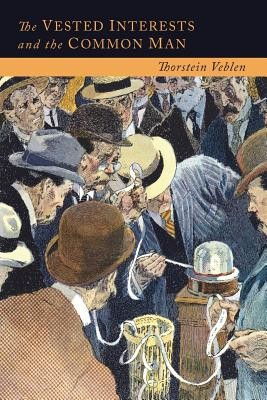
- We will send in 10–14 business days.
- Author: Thorstein Veblen
- Publisher: Martino Fine Books
- Year: 2014
- Pages: 192
- ISBN-10: 1614276331
- ISBN-13: 9781614276333
- Format: 15.2 x 22.9 x 1.1 cm, minkšti viršeliai
- Language: English
- SAVE -10% with code: EXTRA
Reviews
Description
2014 Reprint of 1946 Edition. Full facsimile of the original edition, not reproduced with Optical Recognition Software. Many of the essays in this collection originally appeared in "Dial" from October 1918 to January 1919. "The Vested Interest" includes: "The Instability of Knowledge and Belief," "The Stability of Law and Custom," "The State of the Industrial Arts," "Free Income," "The Vested Interests," "The Divine Rights of Nations," "Live and Let Live," and "The Vested Interests and the Common Man." Veblen saw an inherent conflict between financial interests and industrial interests. Veblen's two-class model of social stratification includes a financial class, which owns wealth invested in large holdings, and an industrial class, whose conditions of life are controlled by others and who live by work. On the one hand, financial leaders are almost exclusively concerned with financial matters-especially profit-and make no contribution to production. Veblen sees these captains of industry as parasitic and exploitative. On the other hand, industry is oriented toward workmanship and production. Unlike the pecuniary financial orientation, the industrial orientation is an impersonal standpoint of quantitative relations and mechanical efficiency. According to Veblen, financial leaders obstruct the operation of the industrial system. Veblen argued that an advanced industrial society would be run most efficiently by production engineers who would look out for the welfare of all members of society rather than the vested interests of business.
- Author: Thorstein Veblen
- Publisher: Martino Fine Books
- Year: 2014
- Pages: 192
- ISBN-10: 1614276331
- ISBN-13: 9781614276333
- Format: 15.2 x 22.9 x 1.1 cm, minkšti viršeliai
- Language: English English
2014 Reprint of 1946 Edition. Full facsimile of the original edition, not reproduced with Optical Recognition Software. Many of the essays in this collection originally appeared in "Dial" from October 1918 to January 1919. "The Vested Interest" includes: "The Instability of Knowledge and Belief," "The Stability of Law and Custom," "The State of the Industrial Arts," "Free Income," "The Vested Interests," "The Divine Rights of Nations," "Live and Let Live," and "The Vested Interests and the Common Man." Veblen saw an inherent conflict between financial interests and industrial interests. Veblen's two-class model of social stratification includes a financial class, which owns wealth invested in large holdings, and an industrial class, whose conditions of life are controlled by others and who live by work. On the one hand, financial leaders are almost exclusively concerned with financial matters-especially profit-and make no contribution to production. Veblen sees these captains of industry as parasitic and exploitative. On the other hand, industry is oriented toward workmanship and production. Unlike the pecuniary financial orientation, the industrial orientation is an impersonal standpoint of quantitative relations and mechanical efficiency. According to Veblen, financial leaders obstruct the operation of the industrial system. Veblen argued that an advanced industrial society would be run most efficiently by production engineers who would look out for the welfare of all members of society rather than the vested interests of business.


Reviews